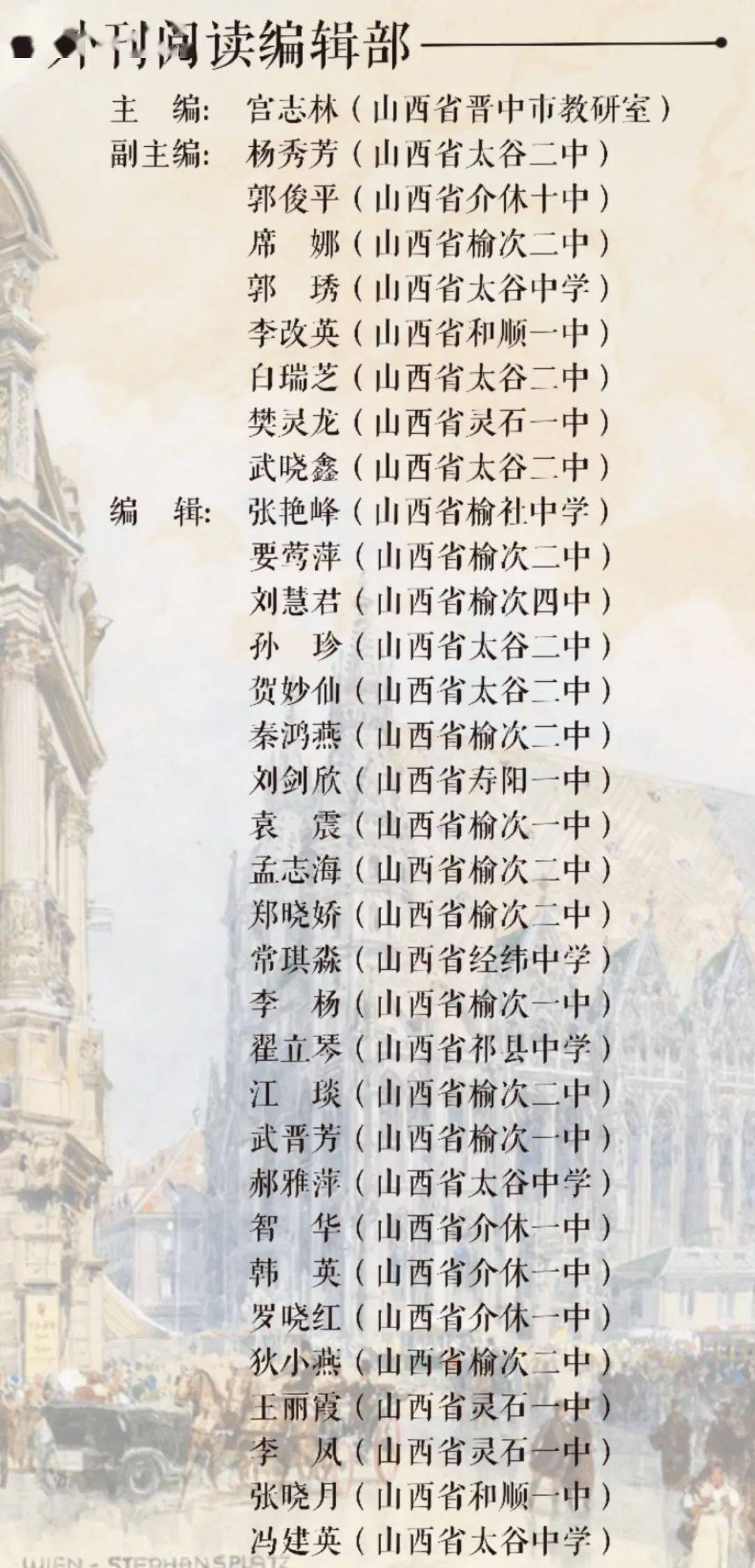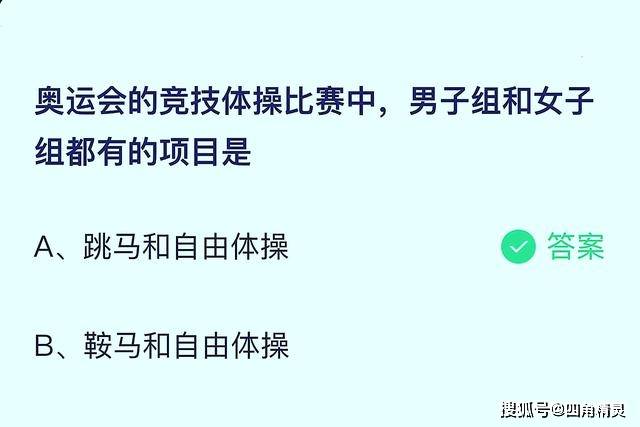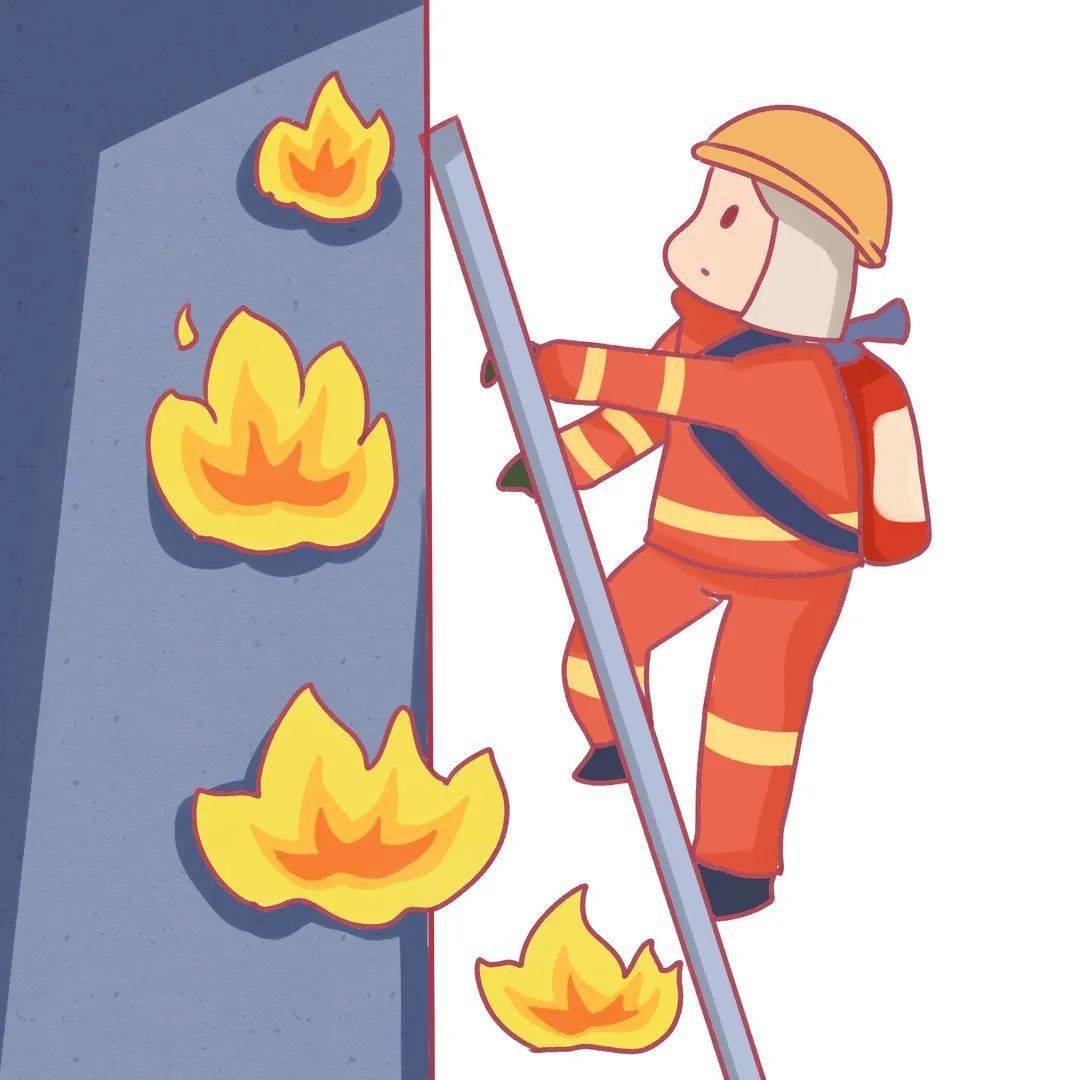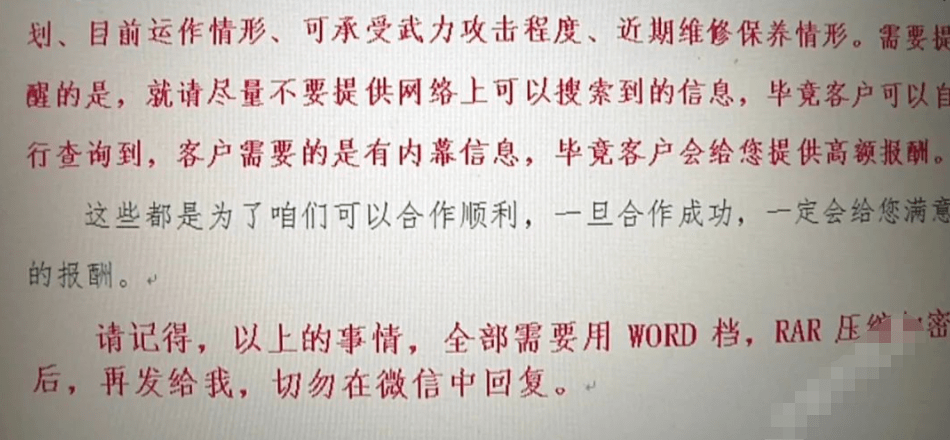原文复现
Lincoln’s Gettysburg Address
(on Nov.19,1863)
Four score and seven years ago, our fathers brought forth upon this continent a new nation, conceived in liberty and dedicated to the proposition that all men are created equal.
Now we are engaged in a great civil war, testing whether that nation, or any nation, so conceived and so dedicated, can long endure.We are met on a great battle field of the war. We have come to dedicate a portion of the field as the final resting-place of those who here gave their lives that that nation might live.It is altogether fitting and proper that we should do this.
But, in a larger sense, we cannot dedicate, we cannot consecrate, we cannot hallow this ground. The brave men, living and dead, who struggled here, have consecrated it, far above our power to add or to detract.The world will little note nor long remember what we say here, but it can never forget what they did here.It is for us, the living, rather, to be dedicated here, to the unfinished work which they who fought here have thus far so nobly advanced. It is rather for us to be here dedicated to the great task remaining before us: that from these honored dead we take increased devotion to that cause for which they here gave the last full measure of devotion; that we here highly resolve that these dead shall not have died in vain; that the nation shall have a new birth of freedom, and that government of the people, by the people, for the people, shall not perish from the earth.
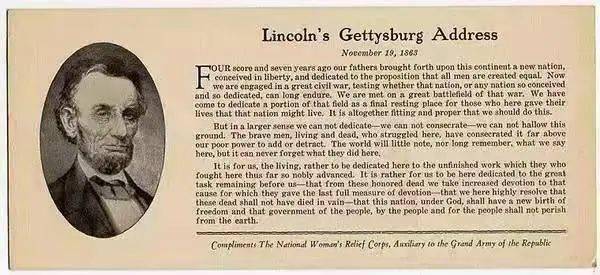
文本解析
01
What
1863年11月19日,林肯应邀出席在葛底斯堡举行的国家烈士公墓典礼,并发表了这篇演说。林肯在立国之本的基础上肯定了南北战争的伟大意义,热情讴歌了勇士们为自由民主平等而献身的崇高精神,鼓舞活着的人们完成烈士们未竟的事业,勉励他们为“民有、民治、民享”的政治理想而奋斗。
02
Why
《葛底斯堡演讲》是林肯众多演讲中最著名的一篇。它短小精悍,措辞精炼,思想深刻,情真意切,雄辩感人,声震寰宇,催人奋进,堪称演说中的典范,一百多年来誉满全球。通过欣赏品读本文,读者能够体会到妙语佳句的朴实优雅,感受到情感的温度和思想的深度,享受到思想和艺术的完美融合,认识到演讲艺术中真正的高超在于能够运用简洁的语言阐明复杂的道理。
03
How
本文属于演讲词。文章结构清晰,逻辑严谨,层层递进,扣人心弦。既有历史的回顾,又有现实的勾勒,更有未来的展望。该篇演讲灵活运用对比、重复等修辞技巧,阐述自由、民主、平等等崇高主题。从国家孕育于自由平等的理想中开场,以“民有、民治、民享”的立国理想收场,全篇首尾呼应,节奏明快,主题突出,如史诗般庄严恢弘。
评判阅读
明析体裁,提炼要素
本文属于演讲词。所谓演讲词就是在各种集会或会议上发表演说的文稿。具体地说,就是指演讲者为表达自己的见解和主张,针对特定的时间、环境和听众,借助于有声语言和体态语言,以理论、抒情为主要表现形式而写成的演讲稿。广义的演讲词包括各种公共场合的讲话、报告、发言、总结以及开幕词、闭幕词、祝酒词等。狭义的演讲词就是指专题演说,是带有极强的感染力的一种应用文体。
《葛底斯堡演说》这篇演讲词篇幅短小,演讲不到三分钟,但在形式上它已近达到了炉火纯青的地步。其思想深刻,结构严谨,语言简练,自然和谐; 句式错落有致,富有变化; 措辞精练,句句朴实优雅。无论是从词汇层面,词组短语层面还是从句法层面都有其独特的文体特征。这些独特的文体特征使得本篇演讲词更加富有感染力。
在这篇演讲中,林肯提出了深入人心的“民有、民治、民享”的口号,成为后人推崇民主政治的纲领。
梳理语篇,获取信息
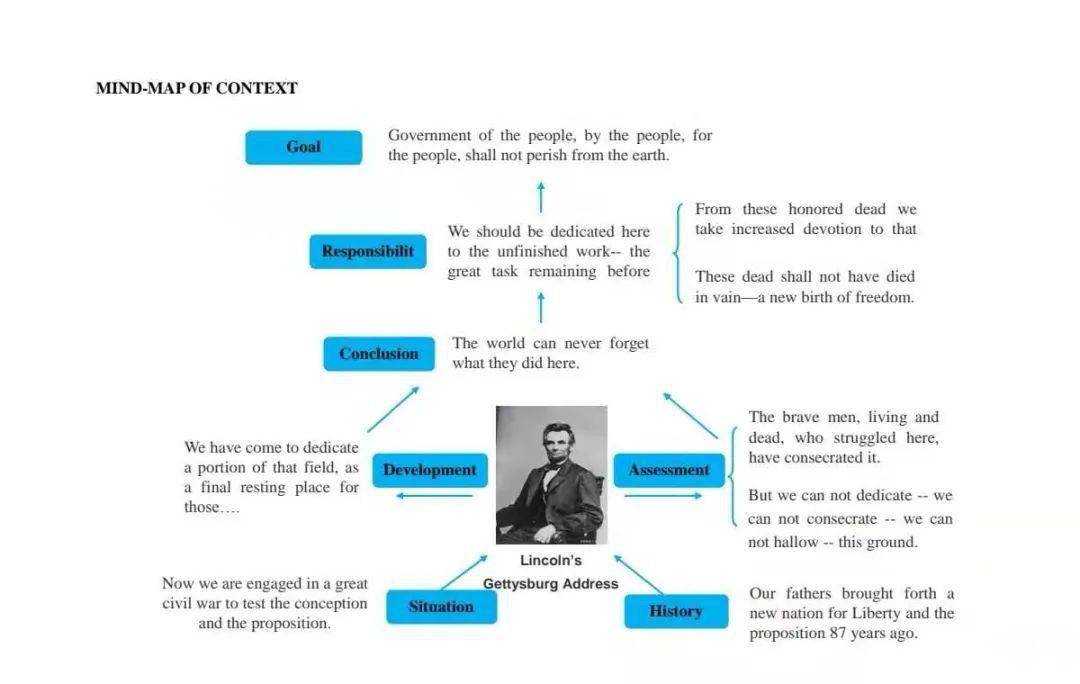
赏析语言,体会优美
巧用修辞:
1. 对比:开头提到birth,结尾提到perish;第8句:The world will little note nor long remember what we say here, but it can never forget what they did here. 本句中little note和nor long remember; what we say here,和what they did here, 形成鲜明的对比,突出了烈士的不朽功绩。第7句:The brave men, living and dead, who struggled here, have consecrated it, far above our power to add or to detract.本句中living和 dead, add和 detract形成对比,正中人心,充满了对已经死去和活着勇士的敬仰和尊重;第10句:It is rather for us to be here dedicated to the great task remaining before us: that from these honored dead we take increased devotion to that cause for which they here gave the last full measure of devotion; that we here highly resolve that these dead shall not have died in vain; that the nation shall have a new birth of freedom and that government of the people, by the people, for the people, shall not perish from the earth.本句中we take和they give形成对比。这些语句形式整齐对称、音律节奏铿锵,不仅加强了语势,而且给人听觉上的美感。
2. 重复:nation被提到了5次,表明作者视“国家”为至高无上并赋予其灵性,同时将演讲者“以人为本”的理念不露声色地传递给听众,达到了一种“此时无声胜有声”的效果。dedicate出现了6次,表达了演讲者对烈士们的颂扬,呼吁美国民众献身祖国。we出现了9次,8次重复使用here,鼓舞美国民众为维护国家的完整而奋斗,突出一种团结精神。
3.排比:But, in a larger sense, we cannot dedicate, we cannot consecrate, we cannot hallow this ground.It is for us, the living, rather, to be dedicated here, to the unfinished work which they who fought here have thus far so nobly advanced. It is rather for us to be here dedicated to the great task remaining before us: that from these honored dead we take increased devotion to that cause for which they here gave the last full measure of devotion; that we here highly resolve that these dead shall not have died in vain; that the nation shall have a new birth of freedom, and that government of the people, by the people, for the people, shall not perish from the earth.这些句中含有铿锵有力的排比句,读来朗朗上口,增强了气势,强化了感染力。另外,结尾处的of the people, by the people, for the people,在句式上构成排比和句尾重复。林肯通过将名词“the people”与分别表示“所属”、“施动”和“目的”含义的三个介词“of”、“by”和“for”的巧妙搭配,清楚地传递了以民为本的理念,充分表明了他的诚意和决心。简洁的语言,丰富的内涵,极具震撼力和感召力,成就了永恒的经典。
4.同义词的使用:本篇中,同义词有:fitting and proper; struggle and fight; work and task; consecrate and hallow 等,这些词项表达了相同或者相近的语义,既有效避免了语义上的重复,又精确细腻地表达了作者的思想感情,语义衔接紧密,语言表达方式灵活,极具语言表现力。
5.句型多样:全文共十句。复杂的长句和简单的短句交叉使用,抑扬顿挫,跌宕起伏,避免单调沉闷之感。例如:最短的句子是只有11个单词的简单句:We are met on a great battle field of the war. 而最长的句子是带有六个从句的复杂句:It is rather for us to be here dedicated to the great task remaining before us: that from these honored dead we take increased devotion to that cause for which they here gave the last full measure of devotion; that we here highly resolve that these dead shall not have died in vain; that the nation shall have a new birth of freedom, and that government of the people, by the people, for the people, shall not perish from the earth.
6.委婉语的使用:“final resting-place”(最后的安息之所)替代词义明确但听起来刺耳、令人不悦的单词“cemetery”或者“graveyard”(墓地,公墓);“gave their lives”代替 “died” 。读起来更加有感情,体现了林肯对烈士们的崇高敬意和缅怀之情。
难词
扫障
proposition n. 主张 观点
battle-field n. 战场
consecrate v. 奉献
hallow v. 把...奉为神圣
detract v. 否认 抹杀
nobly adv. 崇高地
perish vi. 消失 死亡
+ + + +
词块
积累
1. bring forth 生产 产出
2. be dedicated to
对专心致志,为…献身
3. be engaged in忙于 从事于
4. give ones life牺牲 献身
5. in a sense在一定意义上
6. in vain 枉费心机 徒劳无益
7. of the people, by the people, for the people民有、民治、民享的
8. take devotion to致力于
9. have a new birth of freedom拥有新生的自由
+ + + +
熟词
生义
原句1:The world will little note nor long remember what we say here, but it can never forget what they did here.
翻译:我们今天在这里所说的话,全世界不大会注意,也不会长久地记住,但勇士们在这里所做过的事,全世界却永远不会忘记。
分析:note在句中的意思是“注意,留意”,除此之外的含义有很多。
1.Please make a note of the dates. 请记下日期。
2.She left a note for Ben on the kitchen table. 她在厨房的餐桌上给本留了个便条。
3.We only exchange notes and traveller's cheques. 我们只兑换纸币和旅行支票。
4.He played the first few notes of the tune. 他演奏了这支曲子开始的几个音。
5.It is worth noting that the most successful companies had the lowest prices. 值得指出的是最成功的公司价格最低。
原句2:…that from these honored dead we take increased devotion to that cause for which they here gave the last full measure of devotion;…
翻译:(倒是我们这些还活着的人,)应该在这里把自己奉献于勇士们已经如此崇高地向前推进但尚未完成的事业。
分析:cause在句中的意思是“事业”,除此之外的含义:
1.Unemployment is a major cause of poverty. 失业是贫困的主要原因。
2.Do they know what caused the fire? 他们知道引起这场火灾的原因吗?
3.The food was excellent—I had no cause for complaint . 饭菜好极了,我没理由抱怨。
+ + + +
长难句分析
原句1:Four score and seven years ago our fathers brought forth upon this continent a new nation,conceived in liberty,and dedicated to the proposition that all men are created equal.
解析:本句是一个复合句。our fathers为主语,brought forth为谓语动词,conceived in liberty,and dedicated to…为过去分词短语做定语。that all men are created equal为proposition的同位语从句。
翻译:八十七年前,我们先辈在这个大陆上创立了一个新国家,它孕育于自由之中,奉行一切人生来平等的原则。
【高考链接】
The adobe dwellings(土坯房)___built___(build) by the Pueblo Indians of the American Southwest are admired by even the most modern of architects and engineers.
解析:built by…Southwest为过去分词短语做后置定语,修饰The adobe dwellings,谓语动词为are admired。
翻译:美国西南部的印第安人建造的土坯房被即使最现代的建筑家和工程师所钦佩。
原句2:It is rather for us to be here dedicated to the great task remaining before us: that from these honored dead we take increased devotion to that cause for which they here gave the last full measure of devotion; that we here highly resolve that these dead shall not have died in vain; that the nation shall have a new birth of freedom,and that government of the people, by the people, for the people, shall not perish from the earth.
翻译:倒是我们应该在这里把自已奉献于仍然留在我们面前的伟大任务——我们要从这些光荣的死者身上吸取更多的献身精神,来完成他们已经完全彻底为之献身的事业;我们要在这里下定最大的决心,不让这些死者白白牺牲;我们要使国家在上帝福佑下自由的新生,要使这个民有、民治、民享的政府永世长存。
解析:It is rather for us to be here dedicated to the great task remaining before us.” 是主句。"it"是形式主语,真正主语是后面的不定式—to be here dedicated to the great task remaining before us,后面的4个that 从句是task 的同位语。这里使用了排比的修辞手法,最后一句是这篇演说词中最长的一句。在该句中第一个同位语从句是“the great task”的具体内容,即我们应该做什么,第二个同位语从句是誓言,第三个和第四个同位语从句是通过我们的行动所决心达到的目的。
仿写:
1. 被誉为文化瑰宝的敦煌莫高窟在我的家乡。
2. 我们明天放假的消息不是真的。
keys:
1. Mogao Grottoes in Dunhuang, regarded as a cultural treasure, is in my hometown.
2. The news that we are having a holiday tomorrow is not true.
+ + + +
背景知识
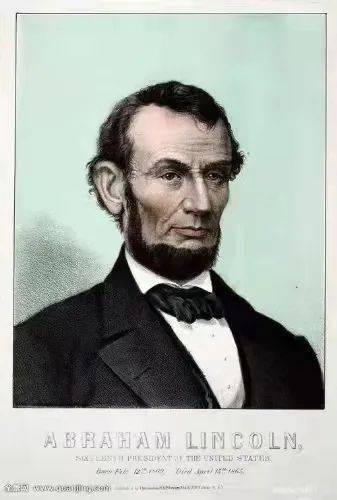
人物
简介
亚伯拉罕·林肯(Abraham Lincoln,1809年-1865年),美国政治家,第16任总统,也是首位共和党籍总统。在其总统任内,美国爆发了内战,史称南北战争。林肯击败了南方分离势力,废除了奴隶制度,维护了国家的统一。他是第一位遭到刺杀的美国总统,更是一位出身贫寒的伟大总统。2006年,亚伯拉罕·林肯被美国的权威期刊《大西洋月刊》评为影响美国的100位人物第1名。最新版5美元纸币正面就是:亚伯拉罕·林肯的照片。
+ + + +
历史
背景
1863年7月3日葛底斯堡战役是美国南北战争中最为残酷的一战,这是南北战争的转折点。这场战役交战双方共死了51000人,而当时美国只有几百万人口。四个月后林肯总统到葛底斯堡战场访问,为这场伟大战役的阵亡将士墓举行落成仪式。这篇演说是在1863年11月19日发表的。这篇演讲被认为是英语演讲中的最高典范,其演讲手稿被藏于美国国会图书馆,其演说辞被铸成金文,长存于牛津大学。
+ + + +
音频
再现
+ + + +
点击边框调出视频工具条
写作提升
· 如何写演讲稿·
演讲稿( speech)也叫演说辞,通常是指在较为隆重的仪式上和某些公共场合发表的文稿。演讲稿的结构常分为开头、正文和结尾三个部分,开头和结尾一般有固定的格式,如开头用 Dear friend, today I am very glad to be here to share with you my ideas of...结尾用That’s all. Thank you for listening.等。如果面对的是熟悉的听众,开头和结尾也可以活泼和灵活些,如开头和结尾可以为: Good morning, everyone... That’s all. Thank you/ Good evening! Ladies and gentlemen... That's all. Thank you. /Hi, everyone. It is so nice to see all of you here... Thats all. Thank you for listening.正文常分为三部分:第一部分开门见山地提出要谈的问题及对问题的看法;第二部分说明理由;第三部分照应开头,总结全文。
演讲就是用强有力的语言号召听众响应演讲人的观点,因此写演讲稿,要注意突出其观点明、结构清楚语言流畅的特点。
常用句必背
1. I really appreciate your making time in your schedules to attend the meeting today.
我非常谢你们今天抽空来参加此次会议。
2. I’ d be happy to tell you about my experience.
我很高兴和你们分享我的经验。
3.Welcometo to the English speech competition/ lecture/party.
欢迎来到这次英语演讲大赛/讲座/聚会。
4. It is my great honor to be here to say something about…
能在这里说关于……是我极大的荣幸。
5. I am very happy to make a speech on behalf of…
我很高兴在这里代表……发言。
6. What I am going to talk about today is...
今天我想讲的是
7. We should choose those who... as our...
我们应该选择那些…的人作为我们的...
8. Finally, it can arouse people’s awareness of...
最后,它可以提高人们的……意识。
9. Working together, we can make the future better.
共同奋斗,我们能让未来更加美好
10. If everyone does a bit for our city, we can benefit a lot.
如果每个人为我们的城市贡献一点,我们就能受益良多。
11. Best wishes for a very successful...!
祝贺...圆满成功!
12. If so, we’ll be able to have a more beautiful world.
如果这样,我们将能拥有一个更加美丽的世界。
写作训练:
假定你是山西省某中学高中学生李华,今年暑假将前往澳大利亚参加主题为WATER FOR LIFE的交流活动。请你以参访代表的身份,根据以下图片提示,用英语写一篇演讲稿。

注意:1. 词数100左右。2. 可以适当增加细节,以使行文连贯。3. 开头语和结束语已为你写好。
Ladies and gentlemen,
Good morning, I am Li Hua from Shanxi, China. ...
That’s all. Thank you.
·上期范文赏析 ·
Dear Max,
I am more than delighted to know that you want to learn about Chinese culture and Confucius. And I am writing to invite you to attend a lecture on Confucius and Chinese traditional culture.
The lecture will begin at 9 o’clock and end at 11 o’clock on May 28th in room 501 of the first teaching building. As a great thinker and educator, Confucius was the founder of Confucianism and had a profound influence on Chinese culture. There is no denying that the lecture is of great importance to us. Not only does it enrich our campus life, but also provides a good opportunity for us to appreciate Chinese traditional culture.
I am looking forward to seeing you in the lecture room.
Yours,
Li Hua
· 优秀作文赏析 ·
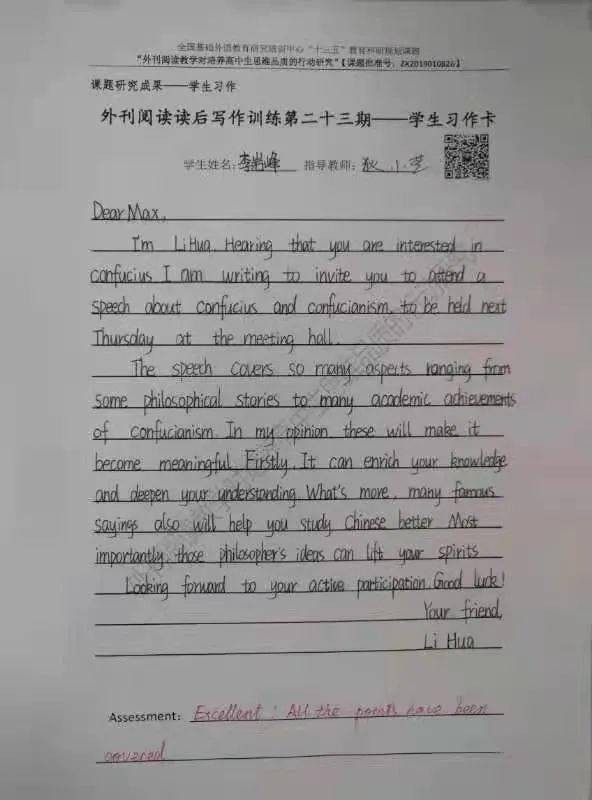
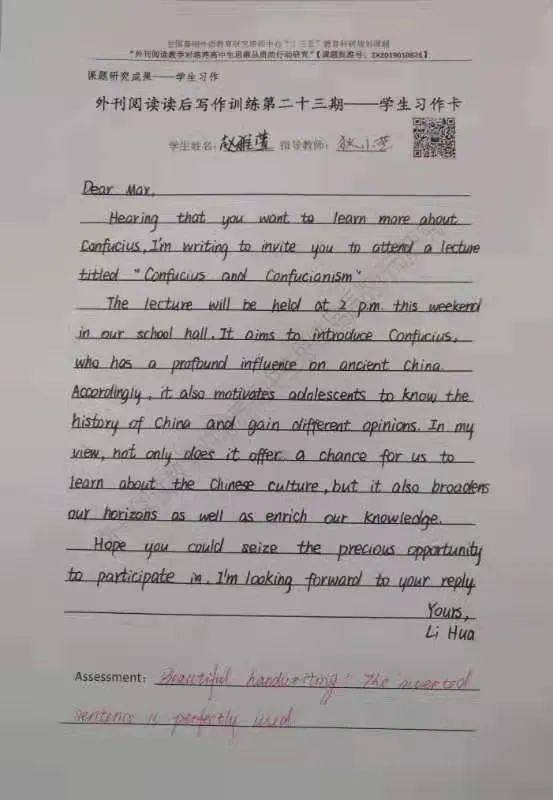
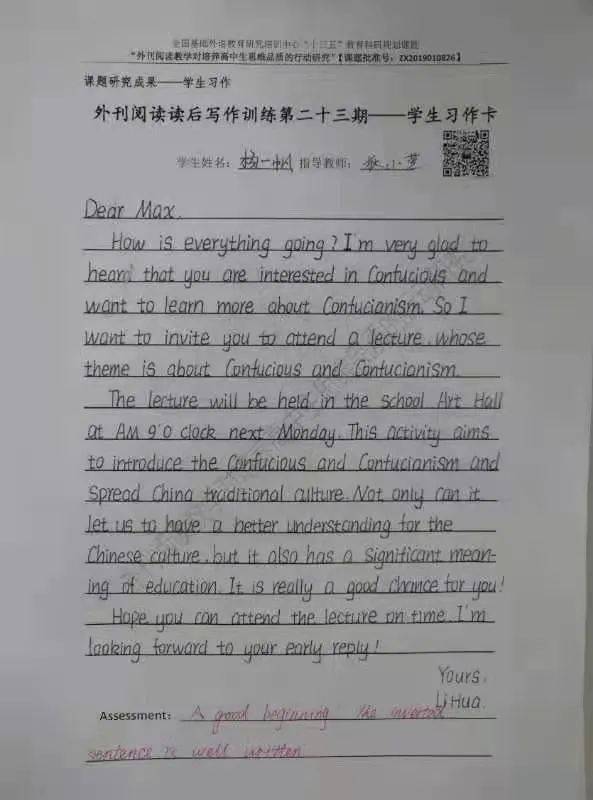
阅读升级
Hello, everybody! Thank you, everybody. All right, everybody go ahead and have a seat. How is everybody doing today? How about Tim Spicer? I am here with students at Wakefield High School in Arlington, Virginia. And we’ve got students tuning in from all across America, from kindergarten through 12th grade. And I am just so glad that all could join us today. And I want to thank Wakefield for being such an outstanding host. Give yourselves a big round of applause.
I know that for many of you, today is the first day of school. And for those of you in kindergarten, or starting middle or high school, it’s your first day in a new school, so it’s understandable if you’re a little nervous. I imagine there are some seniors out there who are feeling pretty good right now-with just one more year to go. And no matter what grade you’re in, some of you are probably wishing it were still summer and you could’ve stayed in bed just a little bit longer this morning.
I know that feeling. When I was young, my family lived overseas. I lived in Indonesia for a few years. And my mother, she didn’t have the money to send me where all the American kids went to school, but she thought it was important for me to keep up with an American education. So she decided to teach me extra lessons herself, Monday through Friday. But because she had to go to work, the only time she could do it was at 4:30 in the morning.
Now, as you might imagine, I wasn’t too happy about getting up that early. And a lot of times, I’d fall asleep right there at the kitchen table. But whenever I’d complain, my mother would just give me one of those looks and she’d say, “This is no picnic for me either, buster.”
So I know that some of you are still adjusting to being back at school. But I’m here today because I have something important to discuss with you. I’m here because I want to talk with you about your education and what’s expected of all of you in this new school year.
Now, I’ve given a lot of speeches about education. And I’ve talked about responsibility a lot.
I’ve talked about teachers’ responsibility for inspiring students and pushing you to learn.
I’ve talked about your parents’ responsibility for making sure you stay on track, and you get your homework done, and don’t spend every waking hour in front of the TV or with the Xbox.
I’ve talked a lot about your government’s responsibility for setting high standards, and supporting teachers and principals, and turning around schools that aren’t working, where students aren’t getting the opportunities that they deserve.
But at the end of the day, we can have the most dedicated teachers, the most supportive parents, the best schools in the world -- and none of it will make a difference, none of it will matter unless all of you fulfill your responsibilities, unless you show up to those schools, unless you pay attention to those teachers, unless you listen to your parents and grandparents and other adults and put in the hard work it takes to succeed. That’s what I want to focus on today: the responsibility each of you has for your education.
I want to start with the responsibility you have to yourself. Every single one of you has something that you’re good at. Every single one of you has something to offer. And you have a responsibility to yourself to discover what that is. That’s the opportunity an education can provide.
Maybe you could be a great writer -- maybe even good enough to write a book or articles in a newspaper -- but you might not know it until you write that English paper -- that English class paper that’s assigned to you. Maybe you could be an innovator or an inventor -- maybe even good enough to come up with the next iPhone or the new medicine or vaccine -- but you might not know it until you do your project for your science class. Maybe you could be a mayor or a senator or a Supreme Court justice -- but you might not know that until you join student government or the debate team.
And no matter what you want to do with your life, I guarantee that you’ll need an education to do it. You want to be a doctor, or a teacher, or a police officer? You want to be a nurse or an architect, a lawyer or a member of our military? You’re going to need a good education for every single one of those careers. You cannot drop out of school and just drop into a good job. You’ve got to train for it and work for it and learn for it.
And this isn’t just important for your own life and your own future. What you make of your education will decide nothing less than the future of this country. The future of America depends on you. What you’re learning in school today will determine whether we as a nation can meet our greatest challenges in the future.
You’ll need the knowledge and problem-solving skills you learn in science and math to cure diseases like cancer and AIDS, and to develop new energy technologies and protect our environment. You’ll need the insights and critical-thinking skills you gain in history and social studies to fight poverty and homelessness, crime and discrimination, and make our nation more fair and more free. You’ll need the creativity and ingenuity you develop in all your classes to build new companies that will create new jobs and boost our economy.
We need every single one of you to develop your talents and your skills and your intellect so you can help us old folks solve our most difficult problems. If you don’t do that -- if you quit on school -- you’re not just quitting on yourself, you’re quitting on your country.
Now, I know it’s not always easy to do well in school. I know a lot of you have challenges in your lives right now that can make it hard to focus on your schoolwork.
I get it. I know what it’s like. My father left my family when I was two years old, and I was raised by a single mom who had to work and who struggled at times to pay the bills and wasn’t always able to give us the things that other kids had. There were times when I missed having a father in my life. There were times when I was lonely and I felt like I didn’t fit in.
So I wasn’t always as focused as I should have been on school, and I did some things I’m not proud of, and I got in more trouble than I should have. And my life could have easily taken a turn for the worse.
But I was -- I was lucky. I got a lot of second chances, and I had the opportunity to go to college and law school and follow my dreams. My wife, our First Lady Michelle Obama, she has a similar story. Neither of her parents had gone to college, and they didn’t have a lot of money. But they worked hard, and she worked hard, so that she could go to the best schools in this country.
Some of you might not have those advantages. Maybe you don’t have adults in your life who give you the support that you need. Maybe someone in your family has lost their job and there’s not enough money to go around. Maybe you live in a neighborhood where you don’t feel safe, or have friends who are pressuring you to do things you know aren’t right.
But at the end of the day, the circumstances of your life -- what you look like, where you come from, how much money you have, what you’ve got going on at home -- none of that is an excuse for neglecting your homework or having a bad attitude in school. That’s no excuse for talking back to your teacher, or cutting class, or dropping out of school. There is no excuse for not trying.
Where you are right now doesn’t have to determine where you’ll end up. No one’s written your destiny for you, because here in America, you write your own destiny. You make your own future.
That’s what young people like you are doing every day, all across America.
I’m thinking about Andoni Schultz, from Los Altos, California, who’s fought brain cancer since he was three. He’s had to endure all sorts of treatments and surgeries, one of which affected his memory, so it took him much longer -- hundreds of extra hours -- to do his schoolwork. But he never fell behind. He’s headed to college this fall.
And then there’s Shantell Steve, from my hometown of Chicago, Illinois. Even when bouncing from foster home to foster home in the toughest neighborhoods in the city, she managed to get a job at a local health care center, start a program to keep young people out of gangs, and she’s on track to graduate high school with honors and go on to college.
And Jazmin, Andoni, and Shantell aren’t any different from any of you. They face challenges in their lives just like you do. In some cases they’ve got it a lot worse off than many of you. But they refused to give up. They chose to take responsibility for their lives, for their education, and set goals for themselves. And I expect all of you to do the same.
That’s why today I’m calling on each of you to set your own goals for your education -- and do everything you can to meet them. Your goal can be something as simple as doing all your homework, paying attention in class, or spending some time each day reading a book. Maybe you’ll decide to get involved in an extracurricular activity, or volunteer in your community. Maybe you’ll decide to stand up for kids who are being teased or bullied because of who they are or how they look, because you believe, like I do, that all young people deserve a safe environment to study and learn. Maybe you’ll decide to take better care of yourself so you can be more ready to learn. And along those lines, by the way, I hope all of you are washing your hands a lot, and that you stay home from school when you don’t feel well, so we can keep people from getting the flu this fall and winter.
But whatever you resolve to do, I want you to commit to it. I want you to really work at it.
I know that sometimes you get that sense from TV that you can be rich and successful without any hard work -- that your ticket to success is through rapping or basketball or being a reality TV star. Chances are you’re not going to be any of those things.
The truth is, being successful is hard. You won’t love every subject that you study. You won’t click with every teacher that you have. Not every homework assignment will seem completely relevant to your life right at this minute. And you won’t necessarily succeed at everything the first time you try.
That’s okay. Some of the most successful people in the world are the ones who’ve had the most failures. J.K. Rowling’s -- who wrote Harry Potter -- her first Harry Potter book was rejected 12 times before it was finally published. Michael Jordan was cut from his high school basketball team. He lost hundreds of games and missed thousands of shots during his career. But he once said, “I have failed over and over and over again in my life. And that’s why I succeed.
These people succeeded because they understood that you can’t let your failures define you -- you have to let your failures teach you. You have to let them show you what to do differently the next time. So if you get into trouble, that doesn’t mean you’re a troublemaker, it means you need to try harder to act right. If you get a bad grade, that doesn’t mean you’re stupid, it just means you need to spend more time studying.
No one’s born being good at all things. You become good at things through hard work. You’re not a varsity athlete the first time you play a new sport. You don’t hit every note the first time you sing a song. You’ve got to practice. The same principle applies to your schoolwork. You might have to do a math problem a few times before you get it right. You might have to read something a few times before you understand it. You definitely have to do a few drafts of a paper before it’s good enough to hand in.
Don’t be afraid to ask questions. Don’t be afraid to ask for help when you need it. I do that every day. Asking for help isn’t a sign of weakness, it’s a sign of strength because it shows you have the courage to admit when you don’t know something, and that then allows you to learn something new. So find an adult that you trust -- a parent, a grandparent or teacher, a coach or a counselor -- and ask them to help you stay on track to meet your goals.
And even when you’re struggling, even when you’re discouraged, and you feel like other people have given up on you, don’t ever give up on yourself, because when you give up on yourself, you give up on your country.
The story of America isn’t about people who quit when things got tough. It’s about people who kept going, who tried harder, who loved their country too much to do anything less than their best.
It’s the story of students who sat where you sit 250 years ago, and went on to wage a revolution and they founded this nation. Young people. Students who sat where you sit 75 years ago who overcame a Depression and won a world war; who fought for civil rights and put a man on the moon. Students who sat where you sit 20 years ago who founded Google and Twitter and Facebook and changed the way we communicate with each other.
So today, I want to ask all of you, what’s your contribution going to be? What problems are you going to solve? What discoveries will you make? What will a President who comes here in 20 or 50 or 100 years say about what all of you did for this country?
Now, your families, your teachers, and I are doing everything we can to make sure you have the education you need to answer these questions. I’m working hard to fix up your classrooms and get you the books and the equipment and the computers you need to learn. But you’ve got to do your part, too. So I expect all of you to get serious this year. I expect you to put your best effort into everything you do. I expect great things from each of you. So don’t let us down. Don’t let your family down or your country down. Most of all, don’t let yourself down. Make us all proud.
Thank you very much, everybody. God bless you. God bless America. Thank you.

多模态阅读
点击边框调出视频工具条
点击边框调出视频工具条
有奖竞赛
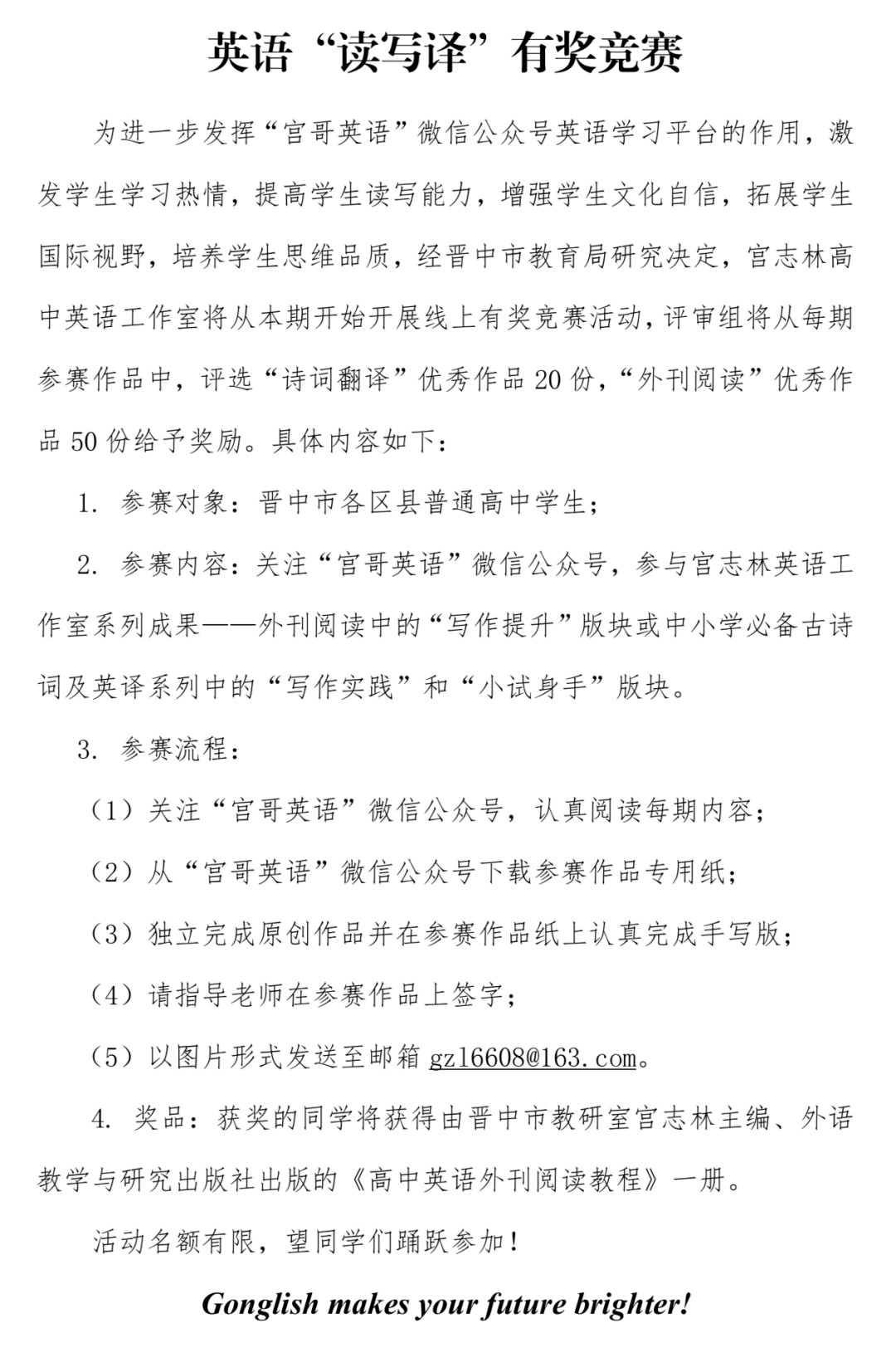

项目简介
外刊阅读项目依托外刊,广泛取材。挑选了难度适中、贴近学生生活的话题素材。对文章进行了文本解析、评判阅读、写作提升、阅读升级和多模态阅读等方面的原创深度挖掘。在提高学生语言能力、文化品质、学习能力的同时,着重提升学生的思维品质。该项目致力于培养具有中国情怀、国际视野和跨文化沟通能力的社会主义建设者和接班人,培养新时代人类命运共同体的建设者和推动者。
欢迎关注
感谢光临《宫哥英语》!欢迎您用微信扫一扫或长按下面的公众号二维码,谢谢您的关注和一如既往地支持。
特别提醒
本公众号正在推出“外刊阅读”系列,请多指正!
本公众号继续推出“中小学必备古诗词英译”系列,请多指正!
本期责编:樊灵龙 翟立琴 江琰 王丽霞
